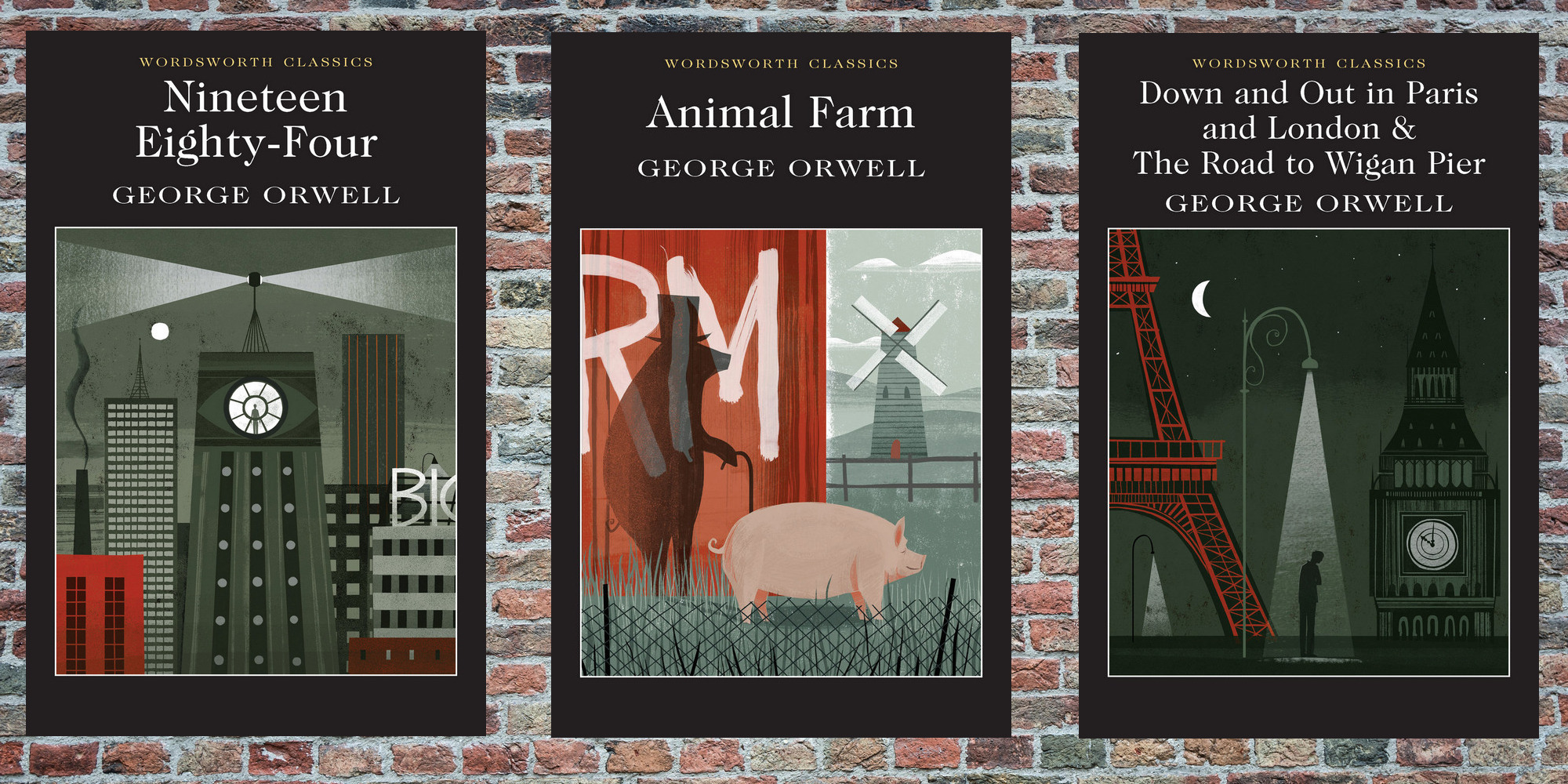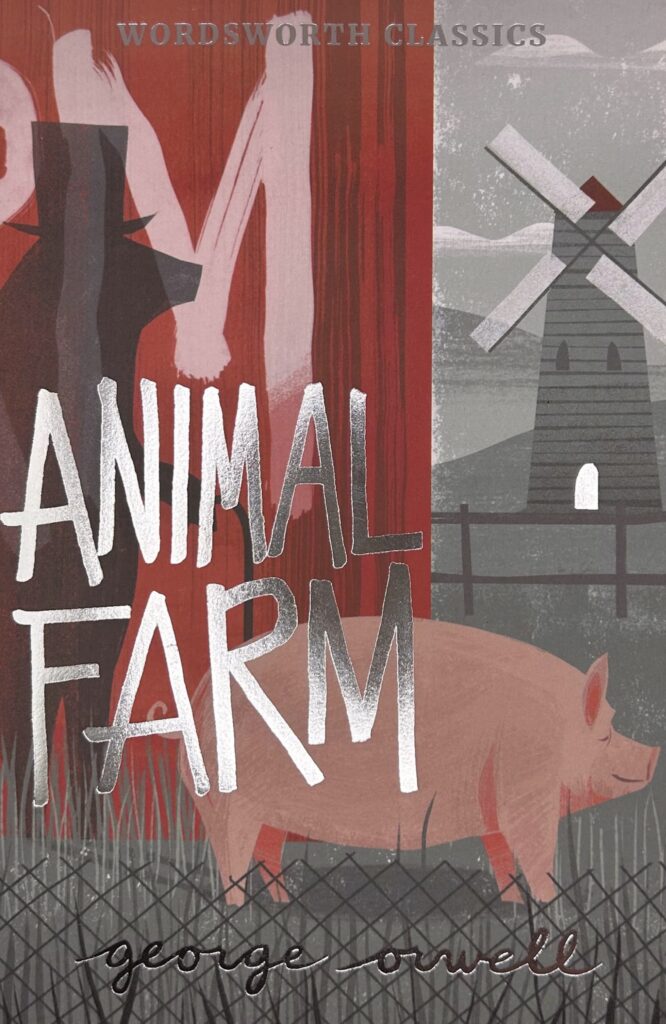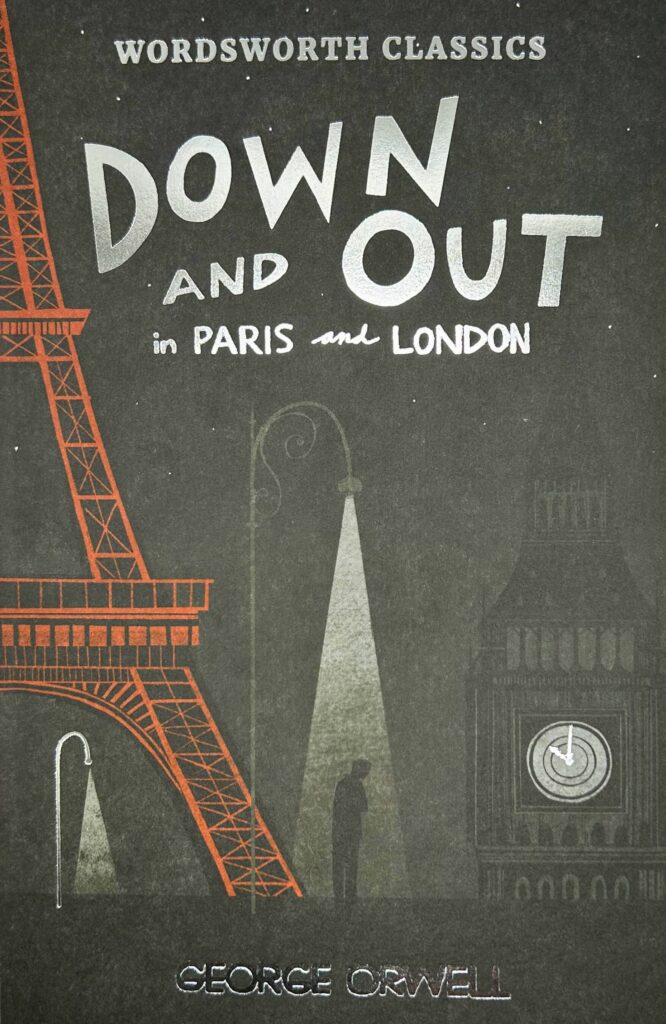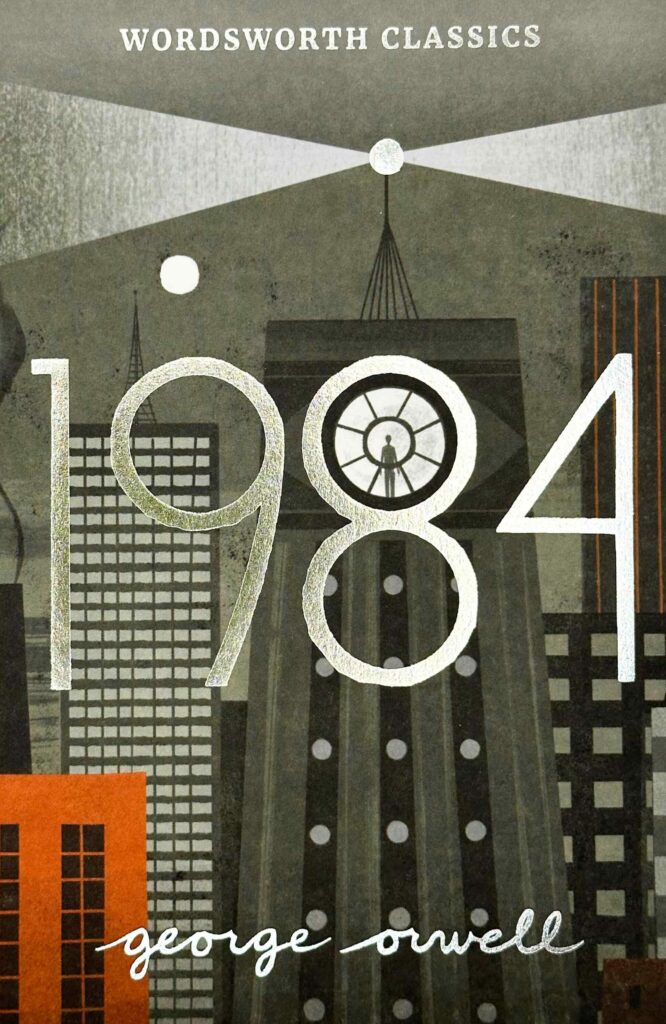
Sally Minogue introduces George Orwell
In January 2021, we publish four seminal works by George Orwell: his fictions, ‘Animal Farm’ and ‘Nineteen Eighty-Four’, and his documentary writings, ‘Down and Out in Paris and London’, and ‘The Road to Wigan Pier’. Sally Minogue offers some introductory remarks.
George Orwell is a chronicler of the past, a reporter of the present, and a seer into the future; but even he could not have predicted a year in which his name, work and ideas have been drawn on so often. ‘Orwellian’: that epithet has been applied to the America of Trump’s fake news, to a Europe in which many citizens have had to print a certificate of permission in order to go out in the street, to a world where free movement can be suddenly halted, passports no longer guarantee entry into another country, or even your own, and the State everywhere has taken measures of control over its peoples unprecedented outside wartime. In this new virus-haunted world we all came to rely on meeting each other through digital images on a flat screen, and previously private domestic spaces were open for all and sundry to see on social media. The books on the bookshelves behind talking heads were examined and cruelly satirised. We were only a step away from the telescreen being ‘on’ all the time, and certainly we composed our faces carefully for Zoom encounters, either to disguise any signs of incipient derangement from the keen gaze of fellow employees and employers, or to reassure our nearest and dearest we were still well, still inherently ourselves.
‘Orwellian’ is itself a sort of misnomer; as Dorian Lynskey says in his self-styled ‘Biography of George Orwell’s 1984’, ‘ the word Orwellian has turned the author’s own name into a capacious synonym for everything he hated and feared’.[1] Most of the things people deem Orwellian in the modern world are drawn from ideas in his final novel Nineteen Eighty-Four: the alteration of the past (Winston Smith’s job in The Ministry of Truth), the loss of individual liberty (it is ‘reasonably certain’ that the simple act of writing a diary ‘would be punished by death’), the dominance of technological surveillance (telescreens), the possibility of external control of the mind as well as the body (Room 101), all stem from Orwell’s vividly imagined totalitarian state in which Big Brother rules supreme. Animal Farm too embodies that vision, in a more strictly allegorical way, and thus one which we can immediately understand and internalise. Even those who have never read this political ‘fairy story’ will recognise the memorable irony of ‘All animals are equal but some animals are more equal than others’. The innocent creatures of Animal Farm, who start with such high ideals, eventually divide into the rulers and the ruled, in a way that seems more poignant because they are animals. Even in the final chapter, after years of harder and harder work, ‘the animals never gave up hope. More, they never lost, even for an instant, their sense of honour and privilege in being members of Animal Farm. … if they worked hard, at least they worked for themselves. No creature among them went upon two legs. No creature called any other creature “Master”. All animals were equal.’ It is soon after this that the pigs get up on their hind legs, whips in hand, and the new slogan, ‘some animals are more equal than others’, is written on the barn wall. As the pigs turn inexorably into humans, so we measure their gradual corruption, and in Swiftian manner the writer’s sharp eye is turned from the page to ourselves.
It is the imaginative power of these fictions which has fixed them in reader’s minds. In Animal Farm we see the puzzled creatures, who have become individual characters for us, trying to adapt to this new contradictory commandment, and we could weep for them. In Nineteen Eighty-Four, it is through the experience of the central protagonist, Winston Smith, that we understand the horrors of the world he inhabits. At the same time this inventiveness and engagement of the reader’s empathy are also in the service of the powerful ideas Orwell wants to put across. Central to these is his warning of the potential all-consuming power of the state over the individual and the inherent corruptibility of any ideology which is enforced without consent. This still speaks significantly to a contemporary readership. Yet the totalitarianism that Orwell saw as such a major threat to liberty in the 1940s, embodied in Communist (USSR) and Fascist (Germany and Italy) authoritarian states, has arguably receded from rather than encroached on the West in the seventy years since his death. Orwell was certainly aware of China as a prime example of totalitarianism, but the more local Communism that he had experienced himself in Europe was what he drew on principally in his dystopian fictions. The collapse of the USSR might look like a counter-example to his vision, as indeed might China’s embrace of the capitalist market. What resonates more now from his powerful warning against totalitarianism is the way in which the citizens of liberal democracies have colluded in their own fate. We carry our own telescreens with us, and see them as an extension of our personal liberty rather than a threat to it. We have somehow allowed the notion of a ‘post-truth’ world to creep into our consciousness though most of us still adhere to the possibility of objective truths, accurate news, and actual facts. At the same time most of those of us who live in a liberal democracy still prize its institutions and its central values; authoritarian ideologies remain a present threat to those, and so Orwell’s fearful vision remains fresh.
One of his shorthand ways of demonstrating that threat in terms of individual freedom of thought is through Winston’s capitulation to his torturer O’Brien, which comes when he loses his hold on the unalterability of the equation ‘2+2=4’. For Orwell, it was still the case, in the non-fictional world, that ‘two and two have to make four when you are, for example, drawing the blueprint of an aeroplane’ (‘The Prevention of Literature’, 1946). But in his essay ‘Looking Back on the Spanish War’, his experience of propaganda during that war had also shown him how easily truth could be subverted and ‘facts’ manipulated, to the point that ‘it often gives me the feeling that the very concept of objective truth is fading out of the world’. In turn this allows the possibility of a world in which ‘If the Leader says of such and such a thing, “it never happened” – well, it never happened. If he says that two and two are five – well, two and two are five. This prospect frightens me much more than bombs… ’. This was Orwell writing in 1943 – the year before President-elect Joe Biden was born. I think we all hope that Joe Biden is a ‘2+2=4’ kind of guy. In the same way, we hope that the pig-dimension of the human personality can still be eclipsed by the solid virtue of a noble Boxer. Orwell’s fictions are warnings rather than predictions; they allow us to see, as he said of Nineteen Eighty-Four, what could happen, not what necessarily would. Armed with this imaginative knowledge, we can be forewarned to prevent it.
Orwell’s essays are gems of prose, and they explore many of the same ideas as the fiction; we have included in each of the three volumes a number of the essays relevant to each text, so that readers can easily refer to them. But it is not surprising that it is initially his fictions, the fabulist Animal Farm and the futurist Nineteen Eighty-Four, that have seized readers ever since these works were first published. Animal Farm has never been out of print, and is a regular text in schools; Nineteen Eighty-Four has found its way into all sorts of cultural forms. Both have been translated into many languages, testament to their ability to cross cultures. There is a malleability in these works; in spite of their appearing to be firmly founded in a historical and political moment, they keep reinventing themselves across time, culture, language and politics. Thus, though we have given a clear account in our introductions of the particular history in which they are founded in order to help the reader locate them, we also urge readers to roam beyond that context and read these as fictions in their own right, for our moment, but also for other moments.
The two non-fiction works, published in one volume, speak to us today in a different way. I said that Orwell looks to the past as well as the present and the future, and in these two works, one of memoir (Down and Out in Paris and London) and one of what we would now call investigative journalism (The Road to Wigan Pier), he places himself in a long tradition of writing about the lives of the least fortunate in society which developed strongly in the nineteenth century. Orwell himself saw Down and Out as an expiation of the guilt of his former self, old Etonian, member of the Indian Imperial Police in Burma, one of the privileged wielding power over the less privileged. Orwell is always interesting when talking about class. In Down and Out he investigates class differences by wrenching himself deliberately out of his own class into what we would now call the underclass, living amongst the lowest manual workers (a plongeur – a washer of dishes) in the kitchen world of Paris, and taking himself into a further level of deprivation in London by becoming a tramp. Then he writes up his experiences. In The Road to Wigan Pier, he approaches the working-class world overtly as a journalist and social investigator, but even here he plunges himself into the experience of that world, living amongst those he is writing about. Temporary as this may be, he gets his hands dirty, and learns what it is like to walk bent double along a deep mine-shaft before you ever start work on the coal-face. He doesn’t attempt the coal-face itself; as he readily admits, a few weeks as a miner would have killed him. But even his brief experience shines through in the writing, as does his respect for the hard life of any manual worker.
Here Orwell plugs into that tradition of excavating lives that have previously been hidden. He is always aware that he comes from outside those lives; but he can make the effort to understand them by inhabiting them, however briefly. And here again, he speaks to us still. We find ourselves once more in a time in which there is great social deprivation, when food banks are needed by the employed as well as the unemployed, when widespread homelessness is a fact of life. Ours is an age of greater affluence, ostensibly, than the late 1920s/ 1930s when Orwell was reporting. His word-pictures might seem like black and white photographs, social documents of a harder time.
[2] But the reality of deprivation in the present is exactly the same as the reality of deprivation in that past. Orwell sets out what is the ‘indispensable minimum without which human life cannot be lived at all’: Enough to eat, freedom from the haunting terror of unemployment, the knowledge that your children will get a fair chance, a bath once a day, clean linen reasonably often, a roof that doesn’t leak, and short enough working hours to leave you with a little energy when the day is done. (‘Looking Back on the Spanish War’)
Too many people at present do not have that ‘indispensable minimum’.
………………………………………………………………………………….
In recent weeks I have been dreaming of libraries. It is a leap from not enough bread on the table, to the importance of libraries. But Orwell was aware of the interdependence of the two. The libraries I have been dreaming of range from the very first library I knew, the mobile library that came to my village, bringing to my mother, and later to me, a world of knowledge in the small span of a van, to the idyllic Oxford interiors of the Bodleian and the Radcliffe Camera – privileged as Orwell’s Eton. But never mind where the books are to be found, it is the books themselves that matter. Orwell had a profound understanding of the power of writing, of the way words can leap from the flat page straight into the minds of readers. His books perform that act of transmigration and imaginative transformation like no other. As the world of 1984 recognised, there is nothing more subversive than words on a page:
Winston fitted a nib into the penholder and sucked it to get the grease off. The pen was an archaic instrument, seldom used even for signatures, and he had procured one, furtively and with some difficulty, simply because of a feeling that the beautiful creamy paper deserved to be written on with a real nib … he dipped the pen into the ink and then faltered for just a second. A tremor had gone through his bowels. To mark the paper was a decisive act.
We make the same decisive act when we read; these works more than most command our attention.
[1] Dorian Lynskey, The Ministry of Truth: A Biography of George Orwell’s 1984, Picador, London, 2019, xiv
[2] The first edition of The Road to Wigan Pier was illustrated with black and white photographs.
Books associated with this article

Animal Farm
George Orwell

Down and Out in Paris and London & The Road to Wigan Pier
George Orwell
